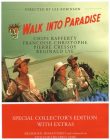

|
CLARK, Jean John WOMERSLEY (2 September 1985) Retired from Forestry 1975. Very well known and admired for his work, particularly with the Botanical Gardens in Lae. He leaves a widow, Mary. Widow of Walter, who retired from Forestry in 1950. Widow of Eric, of Coast Watcher fame, who died in 1968.
Former Senior Administration Officer in Rabaul. He leaves a widow, Ina, and 2 married daughters.
Widow of Mervyn, who was a draftsman with Lands. Widow of Noel, who was Public Service Commissioner in early sixties. Retired from Lands Department in Rabaul in 1970. PWD. Supervisor, retiring in 1975. He leaves a widow, Norma. Pre- and post-war Treasury. Walked overland with group from Wewak to Daru when Japanese invaded. Retired in Moresby in 1958. He leaves a widow, Margaret.
Very well known Moresby building inspector who retired 1970. He leaves a widow, Winifred. Wartime RAAF pilot flying in PNG, later kiap then Magistrate at Moresby, retiring 1975. He leaves a widow, Evelyn.
Charles Rowley’s three main connections with PNG were in the AIF during the war; as Principal of ASOPA, 1950-64; and as Professor of Political Studies at the University of PNG, 1968-74. The field officers, teachers, doctors and others who passed through ASOPA and the University as students in those years—and that would include many of our Members—would be aware of the contribution made by Charles to the development of PNG, both directly by his writings and his advice to the Australian and the PNG governments and indirectly, if you like, by his influence upon these two institutions and upon his students. Many of us owe the inspiration to further our education and to increase our knowledge, to Charles. All of us were made to reflect critically upon what we were doing in PNG, to question our methods, our motives, our philosophies and I am sure we were all better officers from our contact with him. Charles was a prolific writer. Apart from many reviews and articles there were Australians in German New Guinea (1914-21), The New Guinea Villager, and The Politics of Educational Planning in Developing Countries. Then there was the famous trilogy on Australian Aborigines: The Destruction of the Aboriginal Australians, Outcasts in a White Australia, and The Remote Aborigines: a daunting task for any reader. Penguin has published his A Matter of Justice which is short and easy to read and which should be required reading for all Australians. There is also another book ready for publication. It is these latter books and his work on various Commissions and Committees concerned with Aborigines which are now recognised as being such important factors in bringing about the great change in the attitude of thinking Australians towards Aborigines over the last 15 years. Historians will write of Charles Rowley's contribution to the advancement of Australian Aborigines, but I like to think that his contribution to Papua New Guinea will also be remembered in his epitaph.
|
